The Leadership Challenges in Learning Organizations: An Analysis
VerifiedAdded on 2022/12/29
|9
|2113
|84
Essay
AI Summary
This essay delves into the multifaceted challenges of leadership within learning organizations, addressing the core question of how organizations can rapidly translate learning into action for competitive advantage, referencing Jack Welch's statement. It explores the complexities of leadership by reflecting on the challenges and opportunities for improvements. The essay examines three key theoretical frameworks: Experiential Learning Theory, Adaptive and Generative Learning Theory, and Assimilation Theory, providing detailed discussions of their relevance to leadership development. Furthermore, the essay includes a critical analysis of leadership concepts in learning organizations, discussing the importance of shared vision, continuous learning, and the impact of factors like information technology and empowerment. It emphasizes reflective and critical thinking processes within the context of organizational development. The essay concludes by summarizing the key findings and reinforcing the importance of effective leadership in fostering learning environments.
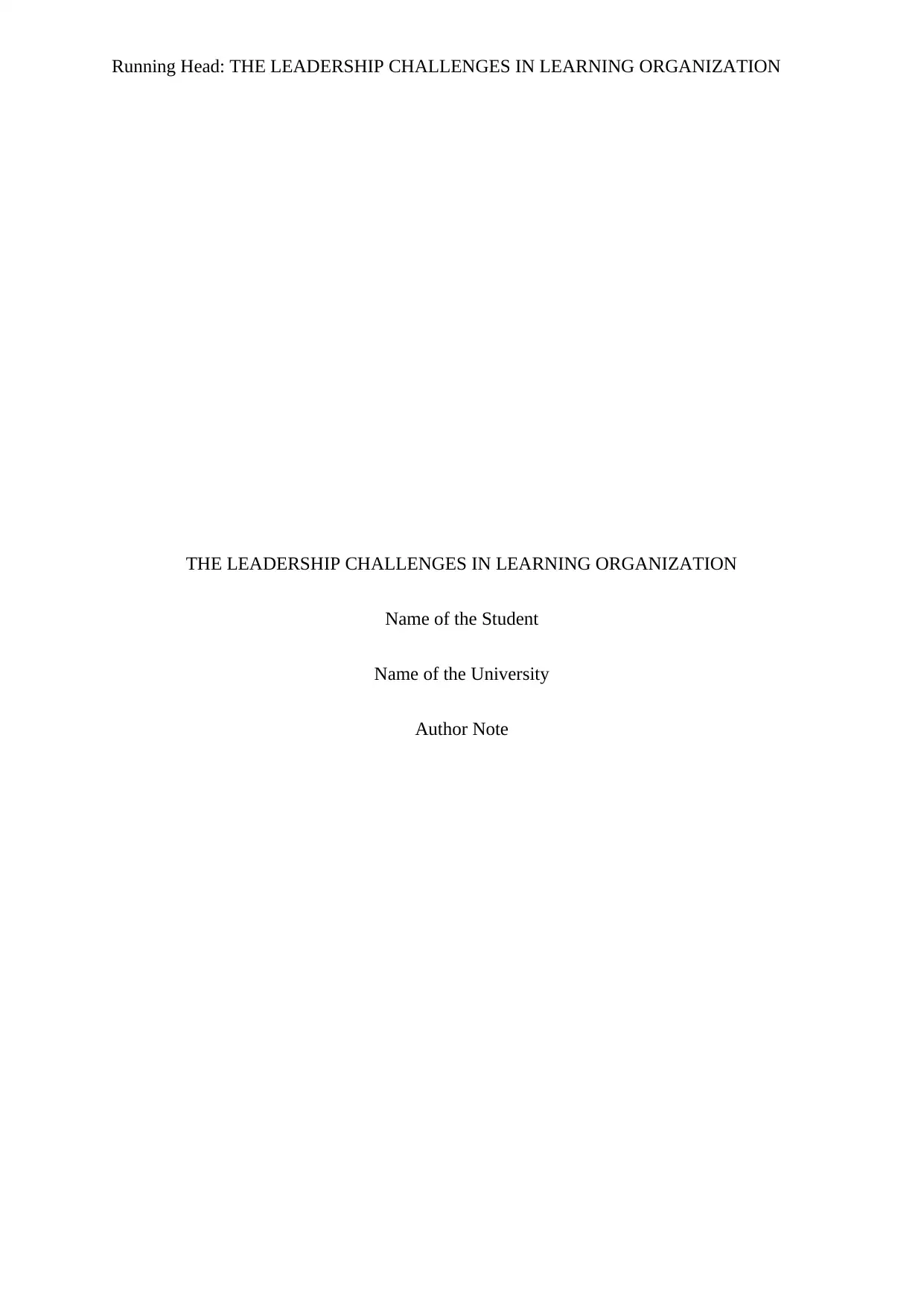
Running Head: THE LEADERSHIP CHALLENGES IN LEARNING ORGANIZATION
THE LEADERSHIP CHALLENGES IN LEARNING ORGANIZATION
Name of the Student
Name of the University
Author Note
THE LEADERSHIP CHALLENGES IN LEARNING ORGANIZATION
Name of the Student
Name of the University
Author Note
Paraphrase This Document
Need a fresh take? Get an instant paraphrase of this document with our AI Paraphraser
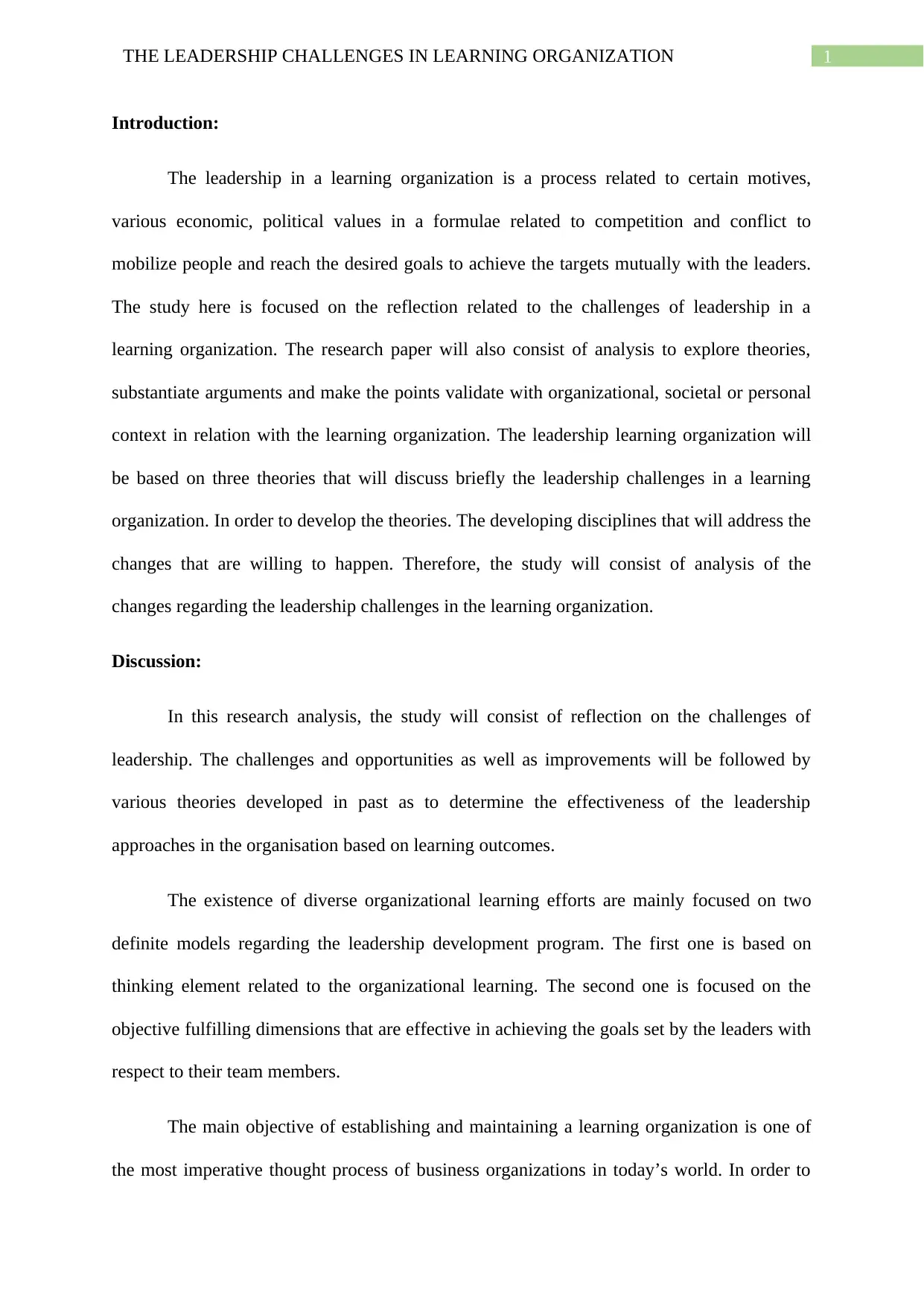
1THE LEADERSHIP CHALLENGES IN LEARNING ORGANIZATION
Introduction:
The leadership in a learning organization is a process related to certain motives,
various economic, political values in a formulae related to competition and conflict to
mobilize people and reach the desired goals to achieve the targets mutually with the leaders.
The study here is focused on the reflection related to the challenges of leadership in a
learning organization. The research paper will also consist of analysis to explore theories,
substantiate arguments and make the points validate with organizational, societal or personal
context in relation with the learning organization. The leadership learning organization will
be based on three theories that will discuss briefly the leadership challenges in a learning
organization. In order to develop the theories. The developing disciplines that will address the
changes that are willing to happen. Therefore, the study will consist of analysis of the
changes regarding the leadership challenges in the learning organization.
Discussion:
In this research analysis, the study will consist of reflection on the challenges of
leadership. The challenges and opportunities as well as improvements will be followed by
various theories developed in past as to determine the effectiveness of the leadership
approaches in the organisation based on learning outcomes.
The existence of diverse organizational learning efforts are mainly focused on two
definite models regarding the leadership development program. The first one is based on
thinking element related to the organizational learning. The second one is focused on the
objective fulfilling dimensions that are effective in achieving the goals set by the leaders with
respect to their team members.
The main objective of establishing and maintaining a learning organization is one of
the most imperative thought process of business organizations in today’s world. In order to
Introduction:
The leadership in a learning organization is a process related to certain motives,
various economic, political values in a formulae related to competition and conflict to
mobilize people and reach the desired goals to achieve the targets mutually with the leaders.
The study here is focused on the reflection related to the challenges of leadership in a
learning organization. The research paper will also consist of analysis to explore theories,
substantiate arguments and make the points validate with organizational, societal or personal
context in relation with the learning organization. The leadership learning organization will
be based on three theories that will discuss briefly the leadership challenges in a learning
organization. In order to develop the theories. The developing disciplines that will address the
changes that are willing to happen. Therefore, the study will consist of analysis of the
changes regarding the leadership challenges in the learning organization.
Discussion:
In this research analysis, the study will consist of reflection on the challenges of
leadership. The challenges and opportunities as well as improvements will be followed by
various theories developed in past as to determine the effectiveness of the leadership
approaches in the organisation based on learning outcomes.
The existence of diverse organizational learning efforts are mainly focused on two
definite models regarding the leadership development program. The first one is based on
thinking element related to the organizational learning. The second one is focused on the
objective fulfilling dimensions that are effective in achieving the goals set by the leaders with
respect to their team members.
The main objective of establishing and maintaining a learning organization is one of
the most imperative thought process of business organizations in today’s world. In order to
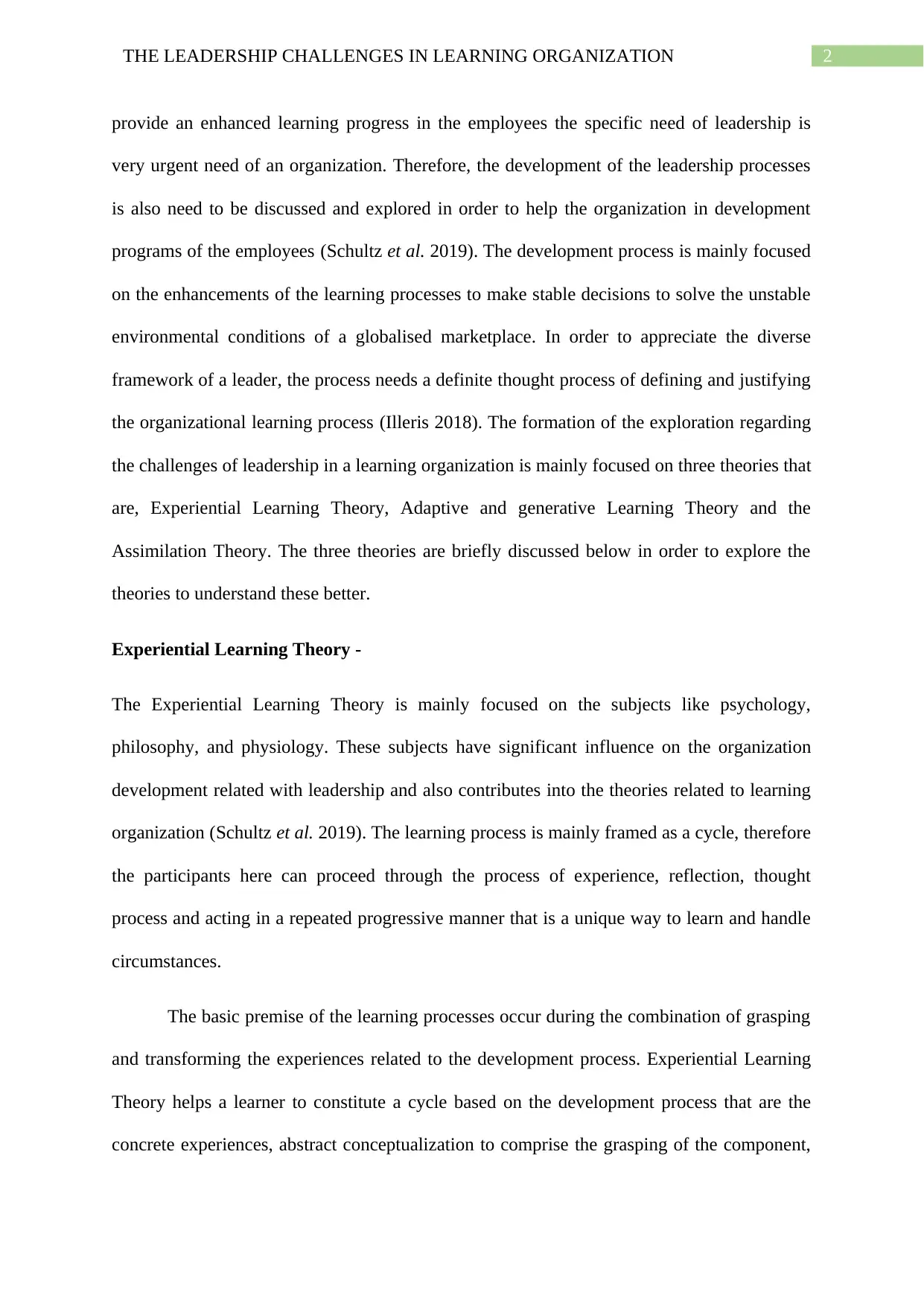
2THE LEADERSHIP CHALLENGES IN LEARNING ORGANIZATION
provide an enhanced learning progress in the employees the specific need of leadership is
very urgent need of an organization. Therefore, the development of the leadership processes
is also need to be discussed and explored in order to help the organization in development
programs of the employees (Schultz et al. 2019). The development process is mainly focused
on the enhancements of the learning processes to make stable decisions to solve the unstable
environmental conditions of a globalised marketplace. In order to appreciate the diverse
framework of a leader, the process needs a definite thought process of defining and justifying
the organizational learning process (Illeris 2018). The formation of the exploration regarding
the challenges of leadership in a learning organization is mainly focused on three theories that
are, Experiential Learning Theory, Adaptive and generative Learning Theory and the
Assimilation Theory. The three theories are briefly discussed below in order to explore the
theories to understand these better.
Experiential Learning Theory -
The Experiential Learning Theory is mainly focused on the subjects like psychology,
philosophy, and physiology. These subjects have significant influence on the organization
development related with leadership and also contributes into the theories related to learning
organization (Schultz et al. 2019). The learning process is mainly framed as a cycle, therefore
the participants here can proceed through the process of experience, reflection, thought
process and acting in a repeated progressive manner that is a unique way to learn and handle
circumstances.
The basic premise of the learning processes occur during the combination of grasping
and transforming the experiences related to the development process. Experiential Learning
Theory helps a learner to constitute a cycle based on the development process that are the
concrete experiences, abstract conceptualization to comprise the grasping of the component,
provide an enhanced learning progress in the employees the specific need of leadership is
very urgent need of an organization. Therefore, the development of the leadership processes
is also need to be discussed and explored in order to help the organization in development
programs of the employees (Schultz et al. 2019). The development process is mainly focused
on the enhancements of the learning processes to make stable decisions to solve the unstable
environmental conditions of a globalised marketplace. In order to appreciate the diverse
framework of a leader, the process needs a definite thought process of defining and justifying
the organizational learning process (Illeris 2018). The formation of the exploration regarding
the challenges of leadership in a learning organization is mainly focused on three theories that
are, Experiential Learning Theory, Adaptive and generative Learning Theory and the
Assimilation Theory. The three theories are briefly discussed below in order to explore the
theories to understand these better.
Experiential Learning Theory -
The Experiential Learning Theory is mainly focused on the subjects like psychology,
philosophy, and physiology. These subjects have significant influence on the organization
development related with leadership and also contributes into the theories related to learning
organization (Schultz et al. 2019). The learning process is mainly framed as a cycle, therefore
the participants here can proceed through the process of experience, reflection, thought
process and acting in a repeated progressive manner that is a unique way to learn and handle
circumstances.
The basic premise of the learning processes occur during the combination of grasping
and transforming the experiences related to the development process. Experiential Learning
Theory helps a learner to constitute a cycle based on the development process that are the
concrete experiences, abstract conceptualization to comprise the grasping of the component,
⊘ This is a preview!⊘
Do you want full access?
Subscribe today to unlock all pages.

Trusted by 1+ million students worldwide
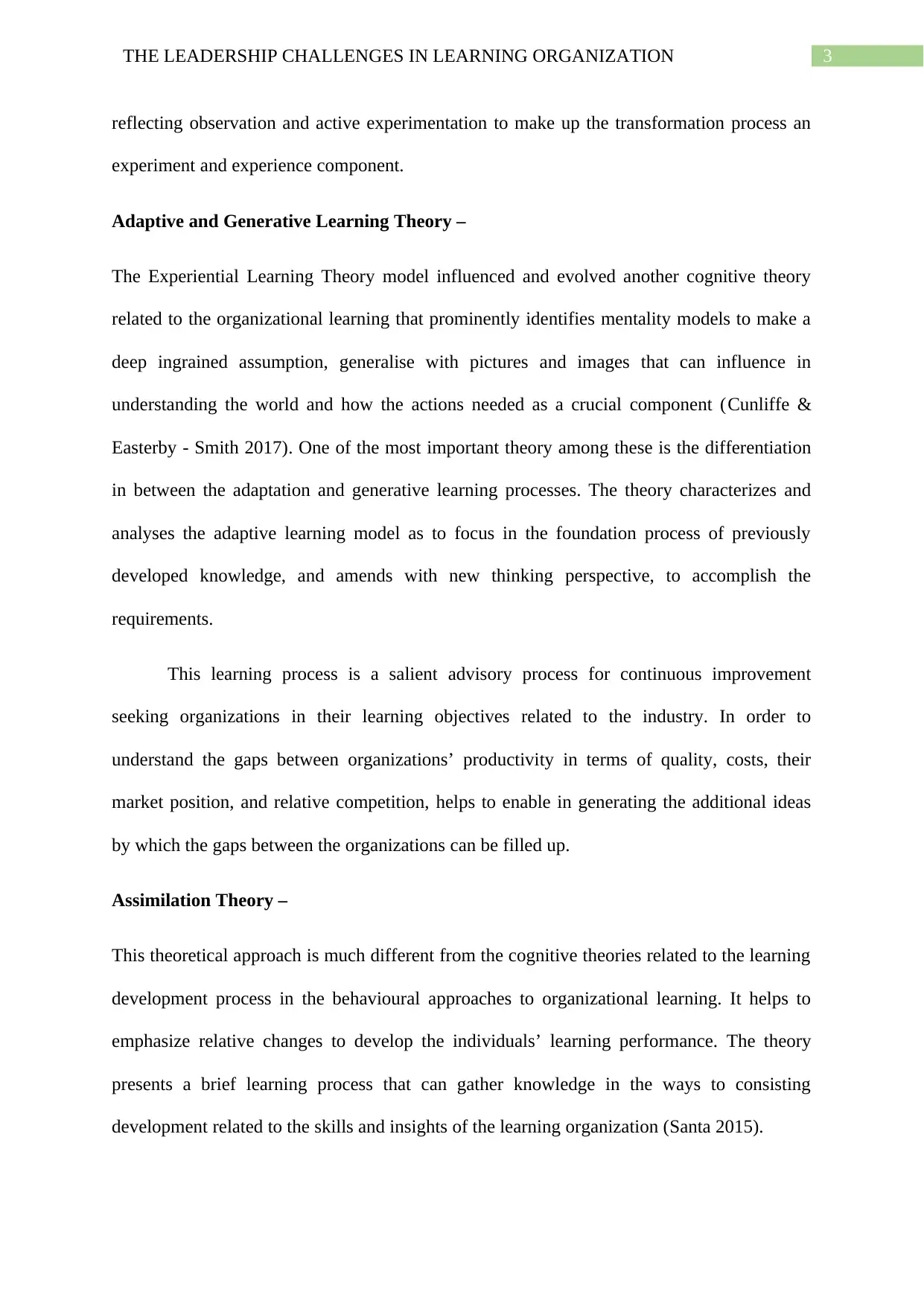
3THE LEADERSHIP CHALLENGES IN LEARNING ORGANIZATION
reflecting observation and active experimentation to make up the transformation process an
experiment and experience component.
Adaptive and Generative Learning Theory –
The Experiential Learning Theory model influenced and evolved another cognitive theory
related to the organizational learning that prominently identifies mentality models to make a
deep ingrained assumption, generalise with pictures and images that can influence in
understanding the world and how the actions needed as a crucial component (Cunliffe &
Easterby - Smith 2017). One of the most important theory among these is the differentiation
in between the adaptation and generative learning processes. The theory characterizes and
analyses the adaptive learning model as to focus in the foundation process of previously
developed knowledge, and amends with new thinking perspective, to accomplish the
requirements.
This learning process is a salient advisory process for continuous improvement
seeking organizations in their learning objectives related to the industry. In order to
understand the gaps between organizations’ productivity in terms of quality, costs, their
market position, and relative competition, helps to enable in generating the additional ideas
by which the gaps between the organizations can be filled up.
Assimilation Theory –
This theoretical approach is much different from the cognitive theories related to the learning
development process in the behavioural approaches to organizational learning. It helps to
emphasize relative changes to develop the individuals’ learning performance. The theory
presents a brief learning process that can gather knowledge in the ways to consisting
development related to the skills and insights of the learning organization (Santa 2015).
reflecting observation and active experimentation to make up the transformation process an
experiment and experience component.
Adaptive and Generative Learning Theory –
The Experiential Learning Theory model influenced and evolved another cognitive theory
related to the organizational learning that prominently identifies mentality models to make a
deep ingrained assumption, generalise with pictures and images that can influence in
understanding the world and how the actions needed as a crucial component (Cunliffe &
Easterby - Smith 2017). One of the most important theory among these is the differentiation
in between the adaptation and generative learning processes. The theory characterizes and
analyses the adaptive learning model as to focus in the foundation process of previously
developed knowledge, and amends with new thinking perspective, to accomplish the
requirements.
This learning process is a salient advisory process for continuous improvement
seeking organizations in their learning objectives related to the industry. In order to
understand the gaps between organizations’ productivity in terms of quality, costs, their
market position, and relative competition, helps to enable in generating the additional ideas
by which the gaps between the organizations can be filled up.
Assimilation Theory –
This theoretical approach is much different from the cognitive theories related to the learning
development process in the behavioural approaches to organizational learning. It helps to
emphasize relative changes to develop the individuals’ learning performance. The theory
presents a brief learning process that can gather knowledge in the ways to consisting
development related to the skills and insights of the learning organization (Santa 2015).
Paraphrase This Document
Need a fresh take? Get an instant paraphrase of this document with our AI Paraphraser
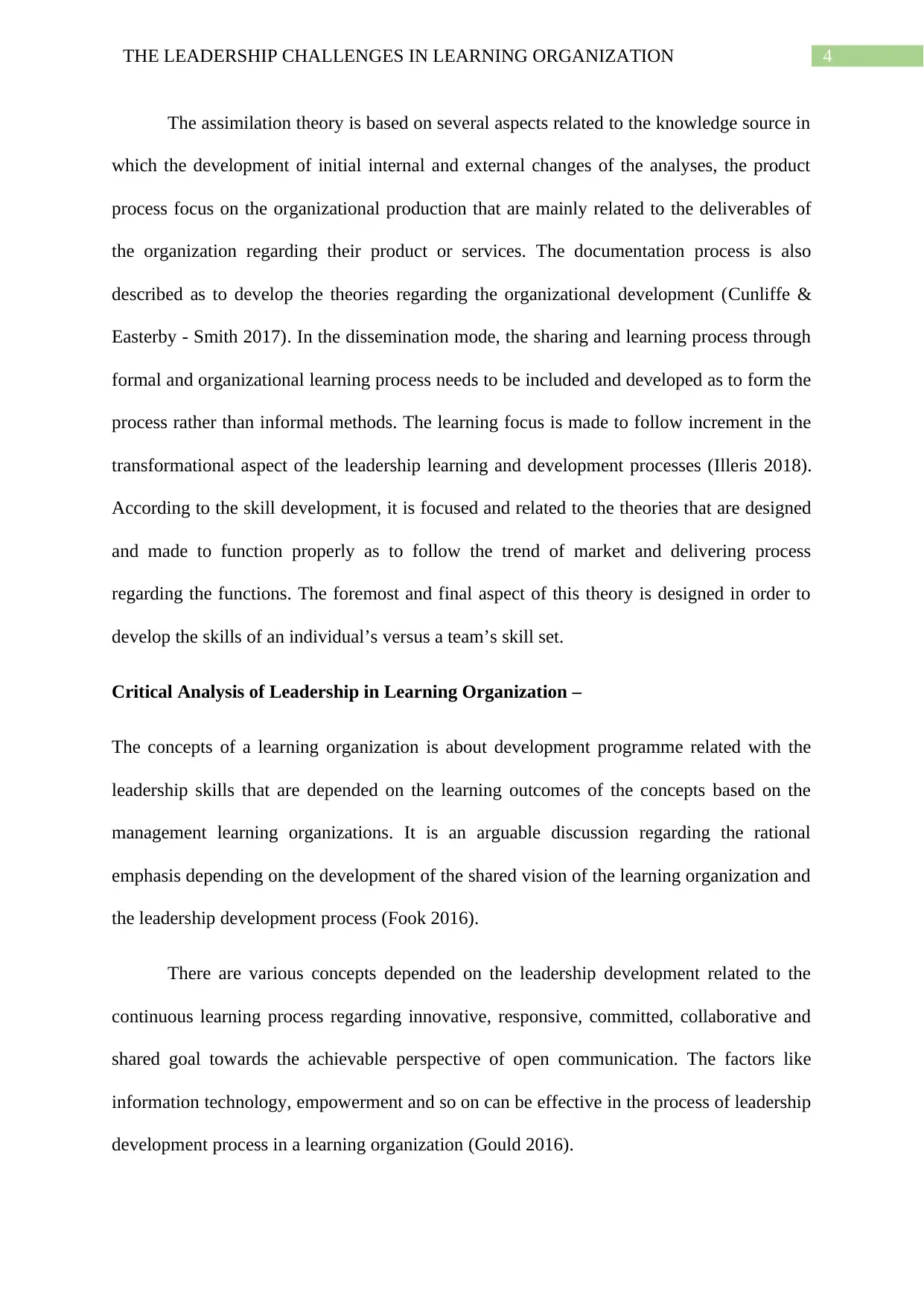
4THE LEADERSHIP CHALLENGES IN LEARNING ORGANIZATION
The assimilation theory is based on several aspects related to the knowledge source in
which the development of initial internal and external changes of the analyses, the product
process focus on the organizational production that are mainly related to the deliverables of
the organization regarding their product or services. The documentation process is also
described as to develop the theories regarding the organizational development (Cunliffe &
Easterby - Smith 2017). In the dissemination mode, the sharing and learning process through
formal and organizational learning process needs to be included and developed as to form the
process rather than informal methods. The learning focus is made to follow increment in the
transformational aspect of the leadership learning and development processes (Illeris 2018).
According to the skill development, it is focused and related to the theories that are designed
and made to function properly as to follow the trend of market and delivering process
regarding the functions. The foremost and final aspect of this theory is designed in order to
develop the skills of an individual’s versus a team’s skill set.
Critical Analysis of Leadership in Learning Organization –
The concepts of a learning organization is about development programme related with the
leadership skills that are depended on the learning outcomes of the concepts based on the
management learning organizations. It is an arguable discussion regarding the rational
emphasis depending on the development of the shared vision of the learning organization and
the leadership development process (Fook 2016).
There are various concepts depended on the leadership development related to the
continuous learning process regarding innovative, responsive, committed, collaborative and
shared goal towards the achievable perspective of open communication. The factors like
information technology, empowerment and so on can be effective in the process of leadership
development process in a learning organization (Gould 2016).
The assimilation theory is based on several aspects related to the knowledge source in
which the development of initial internal and external changes of the analyses, the product
process focus on the organizational production that are mainly related to the deliverables of
the organization regarding their product or services. The documentation process is also
described as to develop the theories regarding the organizational development (Cunliffe &
Easterby - Smith 2017). In the dissemination mode, the sharing and learning process through
formal and organizational learning process needs to be included and developed as to form the
process rather than informal methods. The learning focus is made to follow increment in the
transformational aspect of the leadership learning and development processes (Illeris 2018).
According to the skill development, it is focused and related to the theories that are designed
and made to function properly as to follow the trend of market and delivering process
regarding the functions. The foremost and final aspect of this theory is designed in order to
develop the skills of an individual’s versus a team’s skill set.
Critical Analysis of Leadership in Learning Organization –
The concepts of a learning organization is about development programme related with the
leadership skills that are depended on the learning outcomes of the concepts based on the
management learning organizations. It is an arguable discussion regarding the rational
emphasis depending on the development of the shared vision of the learning organization and
the leadership development process (Fook 2016).
There are various concepts depended on the leadership development related to the
continuous learning process regarding innovative, responsive, committed, collaborative and
shared goal towards the achievable perspective of open communication. The factors like
information technology, empowerment and so on can be effective in the process of leadership
development process in a learning organization (Gould 2016).
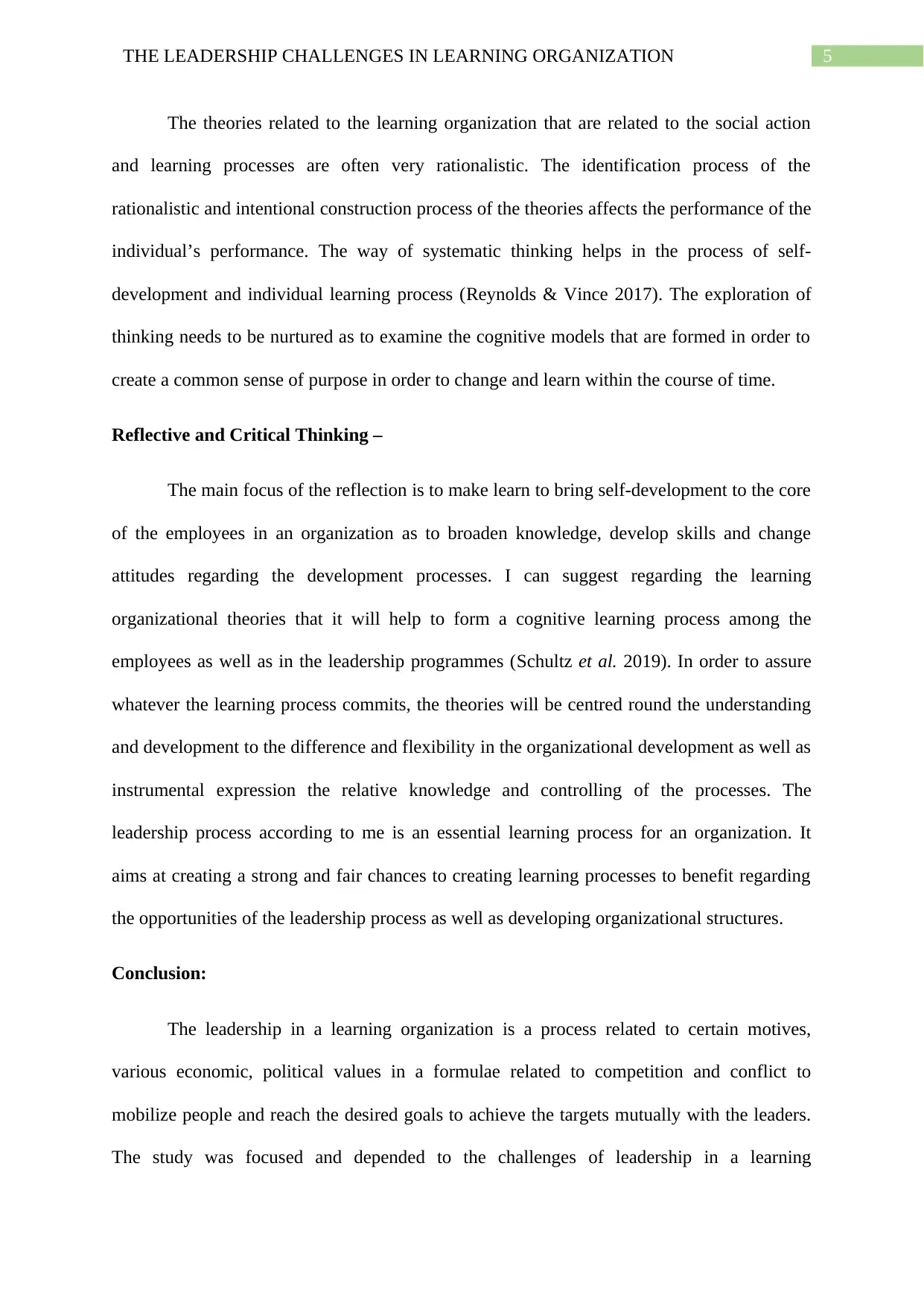
5THE LEADERSHIP CHALLENGES IN LEARNING ORGANIZATION
The theories related to the learning organization that are related to the social action
and learning processes are often very rationalistic. The identification process of the
rationalistic and intentional construction process of the theories affects the performance of the
individual’s performance. The way of systematic thinking helps in the process of self-
development and individual learning process (Reynolds & Vince 2017). The exploration of
thinking needs to be nurtured as to examine the cognitive models that are formed in order to
create a common sense of purpose in order to change and learn within the course of time.
Reflective and Critical Thinking –
The main focus of the reflection is to make learn to bring self-development to the core
of the employees in an organization as to broaden knowledge, develop skills and change
attitudes regarding the development processes. I can suggest regarding the learning
organizational theories that it will help to form a cognitive learning process among the
employees as well as in the leadership programmes (Schultz et al. 2019). In order to assure
whatever the learning process commits, the theories will be centred round the understanding
and development to the difference and flexibility in the organizational development as well as
instrumental expression the relative knowledge and controlling of the processes. The
leadership process according to me is an essential learning process for an organization. It
aims at creating a strong and fair chances to creating learning processes to benefit regarding
the opportunities of the leadership process as well as developing organizational structures.
Conclusion:
The leadership in a learning organization is a process related to certain motives,
various economic, political values in a formulae related to competition and conflict to
mobilize people and reach the desired goals to achieve the targets mutually with the leaders.
The study was focused and depended to the challenges of leadership in a learning
The theories related to the learning organization that are related to the social action
and learning processes are often very rationalistic. The identification process of the
rationalistic and intentional construction process of the theories affects the performance of the
individual’s performance. The way of systematic thinking helps in the process of self-
development and individual learning process (Reynolds & Vince 2017). The exploration of
thinking needs to be nurtured as to examine the cognitive models that are formed in order to
create a common sense of purpose in order to change and learn within the course of time.
Reflective and Critical Thinking –
The main focus of the reflection is to make learn to bring self-development to the core
of the employees in an organization as to broaden knowledge, develop skills and change
attitudes regarding the development processes. I can suggest regarding the learning
organizational theories that it will help to form a cognitive learning process among the
employees as well as in the leadership programmes (Schultz et al. 2019). In order to assure
whatever the learning process commits, the theories will be centred round the understanding
and development to the difference and flexibility in the organizational development as well as
instrumental expression the relative knowledge and controlling of the processes. The
leadership process according to me is an essential learning process for an organization. It
aims at creating a strong and fair chances to creating learning processes to benefit regarding
the opportunities of the leadership process as well as developing organizational structures.
Conclusion:
The leadership in a learning organization is a process related to certain motives,
various economic, political values in a formulae related to competition and conflict to
mobilize people and reach the desired goals to achieve the targets mutually with the leaders.
The study was focused and depended to the challenges of leadership in a learning
⊘ This is a preview!⊘
Do you want full access?
Subscribe today to unlock all pages.

Trusted by 1+ million students worldwide
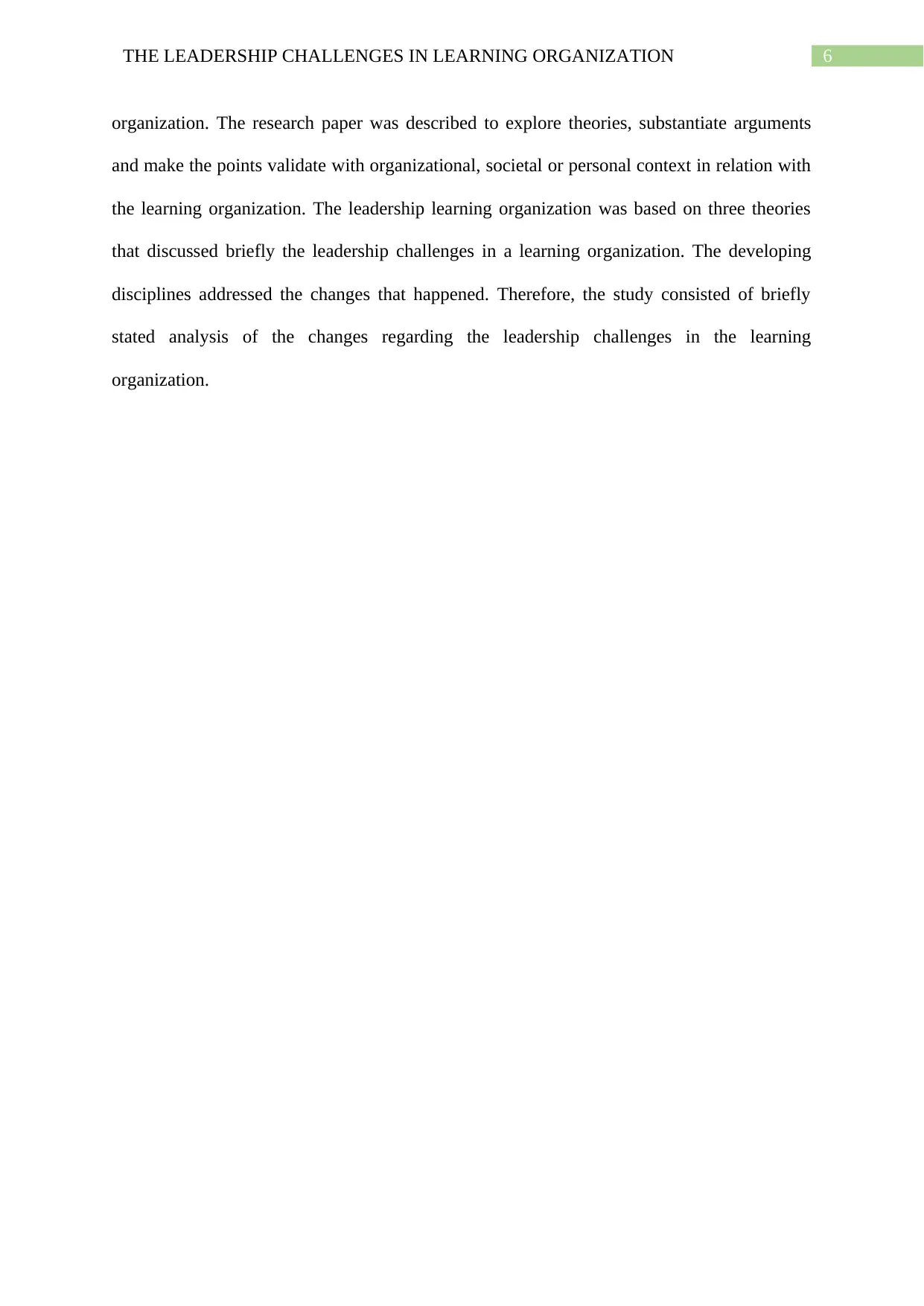
6THE LEADERSHIP CHALLENGES IN LEARNING ORGANIZATION
organization. The research paper was described to explore theories, substantiate arguments
and make the points validate with organizational, societal or personal context in relation with
the learning organization. The leadership learning organization was based on three theories
that discussed briefly the leadership challenges in a learning organization. The developing
disciplines addressed the changes that happened. Therefore, the study consisted of briefly
stated analysis of the changes regarding the leadership challenges in the learning
organization.
organization. The research paper was described to explore theories, substantiate arguments
and make the points validate with organizational, societal or personal context in relation with
the learning organization. The leadership learning organization was based on three theories
that discussed briefly the leadership challenges in a learning organization. The developing
disciplines addressed the changes that happened. Therefore, the study consisted of briefly
stated analysis of the changes regarding the leadership challenges in the learning
organization.
Paraphrase This Document
Need a fresh take? Get an instant paraphrase of this document with our AI Paraphraser
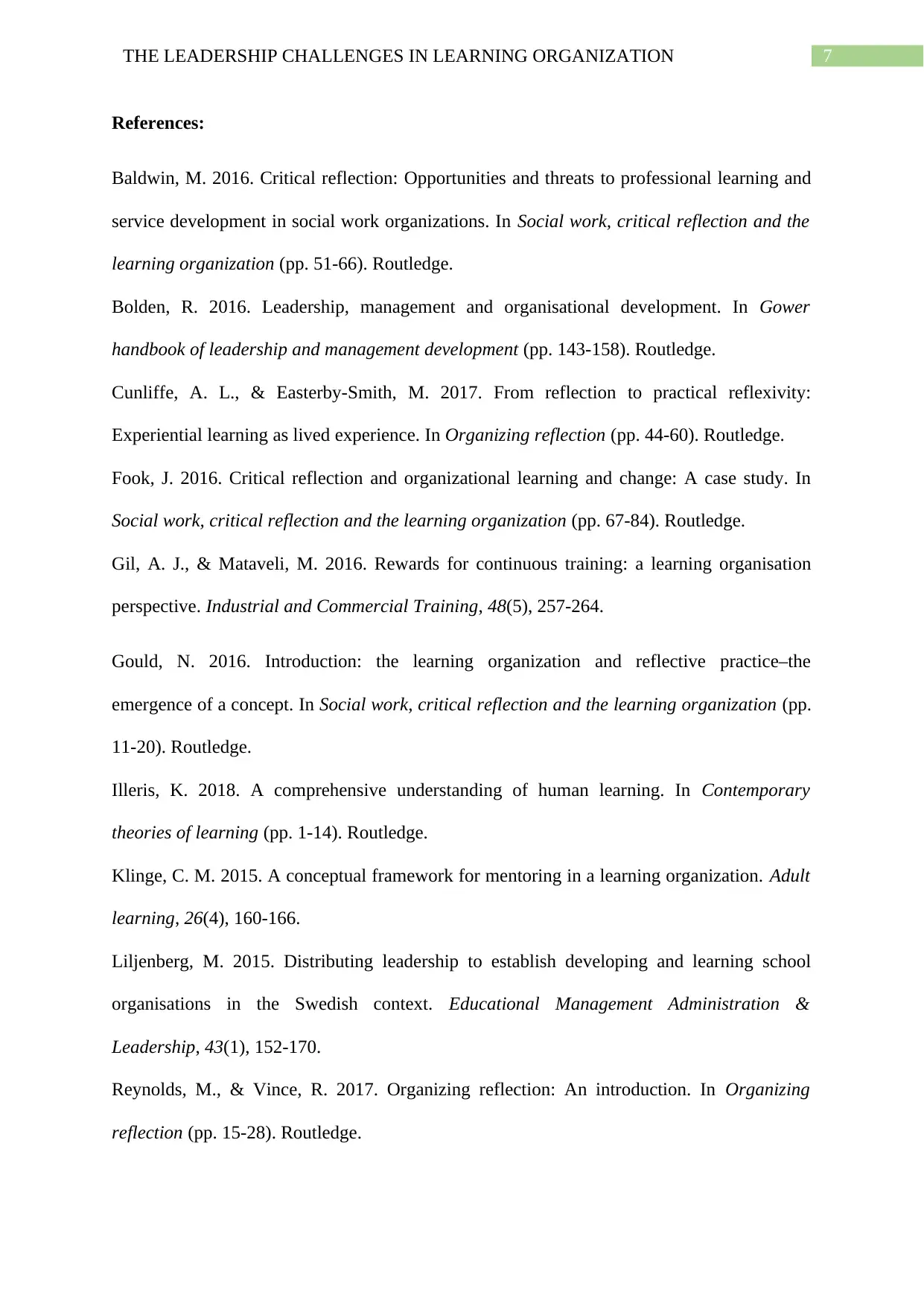
7THE LEADERSHIP CHALLENGES IN LEARNING ORGANIZATION
References:
Baldwin, M. 2016. Critical reflection: Opportunities and threats to professional learning and
service development in social work organizations. In Social work, critical reflection and the
learning organization (pp. 51-66). Routledge.
Bolden, R. 2016. Leadership, management and organisational development. In Gower
handbook of leadership and management development (pp. 143-158). Routledge.
Cunliffe, A. L., & Easterby-Smith, M. 2017. From reflection to practical reflexivity:
Experiential learning as lived experience. In Organizing reflection (pp. 44-60). Routledge.
Fook, J. 2016. Critical reflection and organizational learning and change: A case study. In
Social work, critical reflection and the learning organization (pp. 67-84). Routledge.
Gil, A. J., & Mataveli, M. 2016. Rewards for continuous training: a learning organisation
perspective. Industrial and Commercial Training, 48(5), 257-264.
Gould, N. 2016. Introduction: the learning organization and reflective practice–the
emergence of a concept. In Social work, critical reflection and the learning organization (pp.
11-20). Routledge.
Illeris, K. 2018. A comprehensive understanding of human learning. In Contemporary
theories of learning (pp. 1-14). Routledge.
Klinge, C. M. 2015. A conceptual framework for mentoring in a learning organization. Adult
learning, 26(4), 160-166.
Liljenberg, M. 2015. Distributing leadership to establish developing and learning school
organisations in the Swedish context. Educational Management Administration &
Leadership, 43(1), 152-170.
Reynolds, M., & Vince, R. 2017. Organizing reflection: An introduction. In Organizing
reflection (pp. 15-28). Routledge.
References:
Baldwin, M. 2016. Critical reflection: Opportunities and threats to professional learning and
service development in social work organizations. In Social work, critical reflection and the
learning organization (pp. 51-66). Routledge.
Bolden, R. 2016. Leadership, management and organisational development. In Gower
handbook of leadership and management development (pp. 143-158). Routledge.
Cunliffe, A. L., & Easterby-Smith, M. 2017. From reflection to practical reflexivity:
Experiential learning as lived experience. In Organizing reflection (pp. 44-60). Routledge.
Fook, J. 2016. Critical reflection and organizational learning and change: A case study. In
Social work, critical reflection and the learning organization (pp. 67-84). Routledge.
Gil, A. J., & Mataveli, M. 2016. Rewards for continuous training: a learning organisation
perspective. Industrial and Commercial Training, 48(5), 257-264.
Gould, N. 2016. Introduction: the learning organization and reflective practice–the
emergence of a concept. In Social work, critical reflection and the learning organization (pp.
11-20). Routledge.
Illeris, K. 2018. A comprehensive understanding of human learning. In Contemporary
theories of learning (pp. 1-14). Routledge.
Klinge, C. M. 2015. A conceptual framework for mentoring in a learning organization. Adult
learning, 26(4), 160-166.
Liljenberg, M. 2015. Distributing leadership to establish developing and learning school
organisations in the Swedish context. Educational Management Administration &
Leadership, 43(1), 152-170.
Reynolds, M., & Vince, R. 2017. Organizing reflection: An introduction. In Organizing
reflection (pp. 15-28). Routledge.
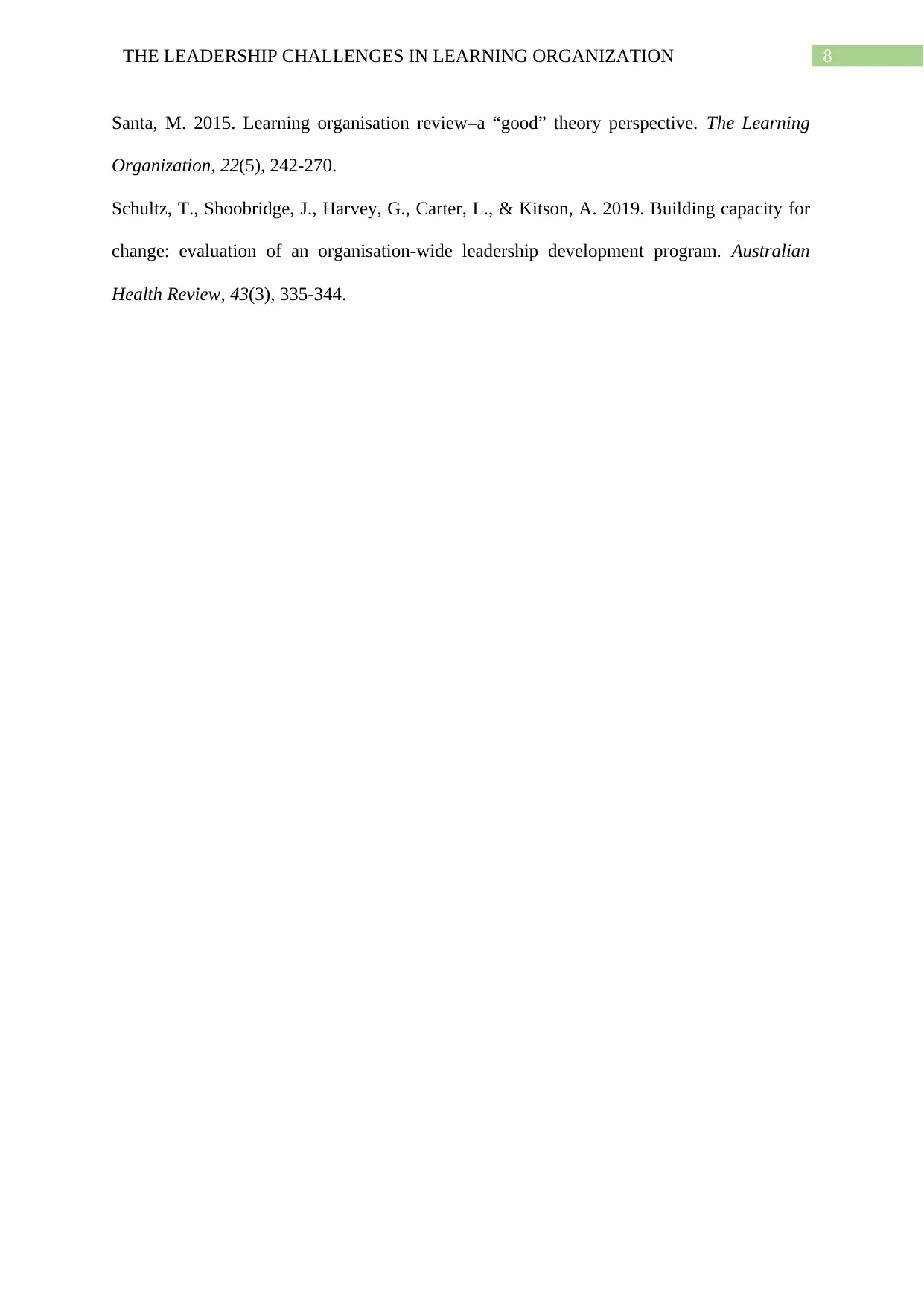
8THE LEADERSHIP CHALLENGES IN LEARNING ORGANIZATION
Santa, M. 2015. Learning organisation review–a “good” theory perspective. The Learning
Organization, 22(5), 242-270.
Schultz, T., Shoobridge, J., Harvey, G., Carter, L., & Kitson, A. 2019. Building capacity for
change: evaluation of an organisation-wide leadership development program. Australian
Health Review, 43(3), 335-344.
Santa, M. 2015. Learning organisation review–a “good” theory perspective. The Learning
Organization, 22(5), 242-270.
Schultz, T., Shoobridge, J., Harvey, G., Carter, L., & Kitson, A. 2019. Building capacity for
change: evaluation of an organisation-wide leadership development program. Australian
Health Review, 43(3), 335-344.
⊘ This is a preview!⊘
Do you want full access?
Subscribe today to unlock all pages.

Trusted by 1+ million students worldwide
1 out of 9
Related Documents
Your All-in-One AI-Powered Toolkit for Academic Success.
+13062052269
info@desklib.com
Available 24*7 on WhatsApp / Email
![[object Object]](/_next/static/media/star-bottom.7253800d.svg)
Unlock your academic potential
Copyright © 2020–2026 A2Z Services. All Rights Reserved. Developed and managed by ZUCOL.





